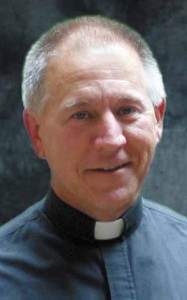By Fr. Bud Grant

Recently I took St. Ambrose students to the Loess Hills of western Iowa. After a five-hour trip through rolling hills of corn, beans and the occasional oak savanna, and just at sunset, we turned south onto Highway 183, tucked up into the base of this astonishing landform. Seeing the broad swath of the Missouri River valley on one side, the steep and heavily wooded hills on the other, the students were stupefied by the unexpected autumnal beauty.
Twenty-four hours later, after a thorough introduction to the hills by Hitchcock Nature Area’s land manager, those initial reactions were virtually reversed. Now they admired the acres of burnt russet prairies as the real gem and scorned the trees for weeds. We’d spent the day with this passionate teacher — who would prefer to be cutting and burning the woods.
That’s right: an ecologist who likes killing trees. He is, you see, struggling against a 100-year-plus human-induced “fire drought” that has all but wiped out this remnant Iowa prairie. Opportunistic Burr Oaks, Eastern Red Cedar and Walnut have been marching up the steep slopes, hogging the sunlight and choking the natives nearly to oblivion. Less than 0.01 percent of Iowa’s prairies remain and most of them are in the Loess (pronounced “luss”) Hills.
Ecologist Chad Graeve, whose name I’ve mentioned in this column a time or two — was intent that the students see, not what they expected, but what is really in front of their eyes. Later, after enjoying a camp stew and a good camp fire, the students expressed concerns: what does it mean to see things differently? How can we attain that shift in perspective?
Christians are quite familiar with the dilemma, aren’t we? The Scriptures are replete with episodes of the blindness of Pharisees. In John 9, the dual images of sight and blindness, light and darkness, are repeated a whopping 38 times, reaching a crescendo with the alliterative judgment: “If you were blind, you would have no sin, but you say ‘we see,’ and so your sin remains” (v.41).
If we are to be prudent stewards of God’s creation — as we must be now as never before in human history — we have to extend the insights of our faith lives to our vision of the natural order around us. The same scrupulous examination of conscience, the same timorous openness to reconciliation, the same anointment of healing grace that allows us to recognize ourselves as sinners and accept one another as forgiven must be applied to how we perceive nature.
We have sinned against God’s earth, sometimes deliberately out of greed for its resources, sometimes — and this is worse — blindly, causing inadvertent calamity without even knowing it, as is the case in the hills.
Of course, opening our eyes is only the first step. What then? It is crucial for me to get this next point across. Chad and others who perform triage on our global ecosystems are not trying to restore some long-lost arcadian Eden. There is no going back and, anyway, go back to what? To when? 1972 — our first Earth Day? 1492? No, these heroes are not trying to freeze a moment in ecological time as if in an outdoor museum. They are trying to restore to health a sick but still viable patient. The Latin word “salus” means health and is the root of our word salvation. This is the vocation of nature’s field medics — to save Creation.
Chad told the students a hopeful anecdote. Having wanted to replant a slope with natives, but unable to afford the seed, he just burned it. Next year, sun rays finally penetrating to the light-starved soil, the place erupted in long dormant native prairie. He had acted, not blindly, but intuitively. He had done what he could with what he had and it was enough. It got things started. He hasn’t looked back since.
(Father Bud Grant is a professor of theology at St. Ambrose University in Davenport.)







